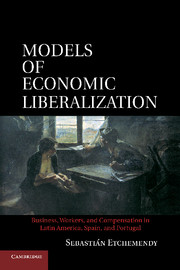 Models of Economic Liberalization
Models of Economic Liberalization Book contents
- Frontmatter
- Contents
- Acknowledgments
- Part I The Intellectual Terrain
- Part II The Political Economy of Business Adjustment
- Part III The Political Economy of Labor Adjustment
- 6 Compensating Labor Insiders
- 7 Statist and Corporatist Models of Labor Adjustment in Spain and Argentina
- Part IV The Market Model
- Part V Comparative Perspectives in Ibero-America
- 10 Conclusions
- Appendix
- Bibliography
- Index
7 - Statist and Corporatist Models of Labor Adjustment in Spain and Argentina
Sectoral Case Studies
from Part III - The Political Economy of Labor Adjustment
Published online by Cambridge University Press: 07 October 2011
- Frontmatter
- Contents
- Acknowledgments
- Part I The Intellectual Terrain
- Part II The Political Economy of Business Adjustment
- Part III The Political Economy of Labor Adjustment
- 6 Compensating Labor Insiders
- 7 Statist and Corporatist Models of Labor Adjustment in Spain and Argentina
- Part IV The Market Model
- Part V Comparative Perspectives in Ibero-America
- 10 Conclusions
- Appendix
- Bibliography
- Index
Summary
Introduction
Over the course of the 1980s and 1990s, labor-based parties in Spain and Argentina embarked on bold projects of market restructuring that hit the working class hard. Neither in Argentina nor in Spain were the consequences of neoliberal reform for the formerly protected industrial workforce left entirely to the whims of the market. Rather, they were shaped through essentially political payoffs. showed, however, that Corporatist and Statist pathways to labor adjustment in Argentina (1989–99) and Spain (1983–96) diverged on three main levels: in policy formulation (labor inclusion and national concertation in Argentina vs. state dirigisme and decentralized bargains with local unions in Spain), in the type and main target of compensatory policies oriented to the working class (bureaucratic payoffs that primarily benefited union leaders vs. job loss subsidies for laid-off workers), and in the level of industrial conflict (low in Argentina vs. high in Spain).
argued that the democratic nature of the polity in both countries is crucial for understanding the commonality: adjustments paths that were made politically viable through compensation bestowed primarily on the organized actors of the working class or insiders, that is, unions or union-backed laid-off workers. The main variable driving the difference in compensatory schemes and policymaking patterns concerns the organizational configuration of unions at the outset of adjustment. In Argentina, an organizationally strong (i.e., monopolistic and centralized) union movement was less likely to face collective-action problems in negotiations with the government and found market-share compensation, such as the partial deregulation of the pro-union labor law or the managing of state assets, attractive to weather the storm of marketization. In Spain, conversely, an organizationally weak labor movement, plural and decentralized, made sustained concertational policymaking more difficult from the outset and was not lured by bureaucratic payoffs but by generous jobless programs targeted primarily at base unionists and workers.
- Type
- Chapter
- Information
- Models of Economic LiberalizationBusiness, Workers, and Compensation in Latin America, Spain, and Portugal, pp. 189 - 218Publisher: Cambridge University PressPrint publication year: 2011


